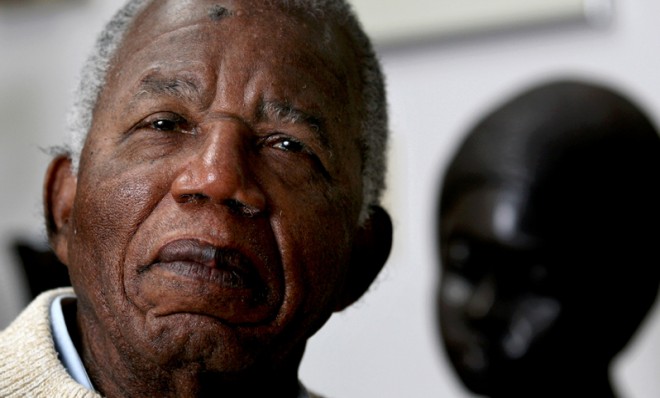Chinua Achebe, author of Things Fall Apart, dies at 82
The Nigerian author was a towering figure in African literature


A free daily email with the biggest news stories of the day – and the best features from TheWeek.com
You are now subscribed
Your newsletter sign-up was successful
Chinua Achebe, the author of Things Fall Apart, a classic of post-colonial African literature, has died at the age of 82.
Often referred to as the grandfather of African letters, the Nigerian was the author of more than 20 books, opening the world's eyes to an entire continent and the impact colonialism had on its people. Nelson Mandela once said Achebe had "brought Africa to the rest of the world."
Things Fall Apart remains his most famous book, a tragedy of Shakespearean depth that tells the story of the Igbo ethnic group's struggle to retain its identity in the face of colonial pressures from the British in the late 19th century. The book, first published in 1958, has been translated into 45 different languages, sold millions of copies, and become a staple of educational curriculums in the West.
The Week
Escape your echo chamber. Get the facts behind the news, plus analysis from multiple perspectives.

Sign up for The Week's Free Newsletters
From our morning news briefing to a weekly Good News Newsletter, get the best of The Week delivered directly to your inbox.
From our morning news briefing to a weekly Good News Newsletter, get the best of The Week delivered directly to your inbox.
Achebe was also a trenchant critic of the corruption and violence that has characterized much of African governance since the end of the colonial era. He was also valued as a literary critic, particularly for shedding light on racial biases in the Western cannon. As a critic, he is best known for his takedown of Joseph Conrad's Heart of Darkness, the story of a European who goes mad in the depths of Africa. "Can nobody see the preposterous and perverse arrogance in thus reducing Africa to the role of props for the break-up of one petty European mind?" Achebe fumed, in an essay called "An Image of Africa: Racism in Conrad's Heart of Darkness."
Achebe was a perennial contender for the Nobel Prize in Literature, but never won it. He was awarded the Man Booker international prize in 2007.
In a 1994 interview with The Paris Review, Achebe summed up his thoughts on literature thusly:
I think every book I've done has tried to be different; this is what I set out to do, because I believe in the complexity of the human story and that there's no way you can tell that story in one way and say, This is it. Always there will be someone who can tell it differently depending on where they are standing; the same person telling the story will tell it differently. I think of that masquerade in Igbo festivals that dances in the public arena. The Igbo people say, If you want to see it well, you must not stand in one place. The masquerade is moving through this big arena. Dancing. If you're rooted to a spot, you miss a lot of the grace. So you keep moving, and this is the way I think the world's stories should be told — from many different perspectives. [The Paris Review]
A free daily email with the biggest news stories of the day – and the best features from TheWeek.com
Ryu Spaeth is deputy editor at TheWeek.com. Follow him on Twitter.
-
 6 exquisite homes with vast acreage
6 exquisite homes with vast acreageFeature Featuring an off-the-grid contemporary home in New Mexico and lakefront farmhouse in Massachusetts
-
 Film reviews: ‘Wuthering Heights,’ ‘Good Luck, Have Fun, Don’t Die,’ and ‘Sirat’
Film reviews: ‘Wuthering Heights,’ ‘Good Luck, Have Fun, Don’t Die,’ and ‘Sirat’Feature An inconvenient love torments a would-be couple, a gonzo time traveler seeks to save humanity from AI, and a father’s desperate search goes deeply sideways
-
 Political cartoons for February 16
Political cartoons for February 16Cartoons Monday’s political cartoons include President's Day, a valentine from the Epstein files, and more